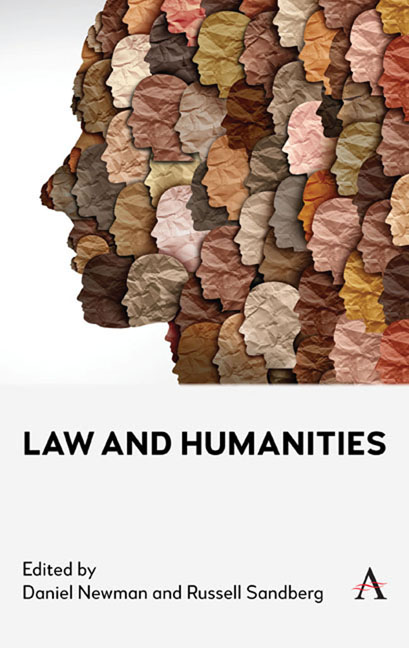Book contents
- Frontmatter
- Contents
- Preface
- List of Contributors
- Chapter One Introducing Law and Humanities
- Chapter Two Law and Archaeology
- Chapter Three Law and Comics/Graphic Justice
- Chapter Four Law and Film
- Chapter Five Law and Geography
- Chapter Six Law and History
- Chapter Seven Law and Literature
- Chapter Eight Law and Philosophy
- Chapter Nine Law and Popular Music
- Chapter Ten Law and Religion
- Chapter Eleven Law and Television
- Chapter Twelve Law and Theatre
- Chapter Thirteen Law and Theology
- Chapter Fourteen Law and Video Games
- Chapter Fifteen Conclusion: Subverting the Law and Humanities Canon
- Index
Chapter Eleven - Law and Television
Published online by Cambridge University Press: 27 March 2024
- Frontmatter
- Contents
- Preface
- List of Contributors
- Chapter One Introducing Law and Humanities
- Chapter Two Law and Archaeology
- Chapter Three Law and Comics/Graphic Justice
- Chapter Four Law and Film
- Chapter Five Law and Geography
- Chapter Six Law and History
- Chapter Seven Law and Literature
- Chapter Eight Law and Philosophy
- Chapter Nine Law and Popular Music
- Chapter Ten Law and Religion
- Chapter Eleven Law and Television
- Chapter Twelve Law and Theatre
- Chapter Thirteen Law and Theology
- Chapter Fourteen Law and Video Games
- Chapter Fifteen Conclusion: Subverting the Law and Humanities Canon
- Index
Summary
Introduction: The Development of Law and Television
This chapter describes the burgeoning research area of law and television. I deliberately call law and television a research ‘area’ rather than a ‘field’ because it is not clear whether law and television is a field in its own right. More aptly, it is part of law and popular culture, which is a known, defined, interdisciplinary field. Popular culture refers to popular products manufactured for popular consumption: those forms of culture that are well liked by many people, are widely shared and are often used in everyday life. Popular culture includes TV shows, but it also includes films, novels, music and video games. When we think about television, we see that it changes over time, has a commercial nature, is class-, gender- and age-coded, varies in importance and popularity to different people in different regions and can be a source of escapism or fun. Any particular television show, whether watched on network television or streamed from a subscription service on a personal device, can have more than one meaning. The larger field of law and popular culture studies the nexus between popular products and law and argues that law can be understood as popular culture and popular culture as law. It is an interdisciplinary relationship where popular culture and law continuously meet and renegotiate one another. Law and television, as an area under the umbrella of law and popular culture, studies the relationship of law as culture and culture as law as manifested in the specific area of television.
In the early days of law and popular culture the term ‘popular’ was used to distinguish between ‘categories’ of culture. In the 1980s, popular culture was often defined in contrast to other types of culture, such as high or national culture. A number of scholars played an important part in the development of law and popular culture. In 1986 Anthony Chase noted the failure of legal scholars to recognise and embrace the images of law and lawyers in popular culture as legitimate subjects of scholarly study. Stewart Macaulay gave a noteworthy presidential address on ‘Images of Law in Everyday Life’ at the 1986 Law and Society Association conference a nd Lawrence Friedman wrote an influential article in the 1989 Yale Law Journal.
- Type
- Chapter
- Information
- Law and Humanities , pp. 175 - 186Publisher: Anthem PressPrint publication year: 2024



